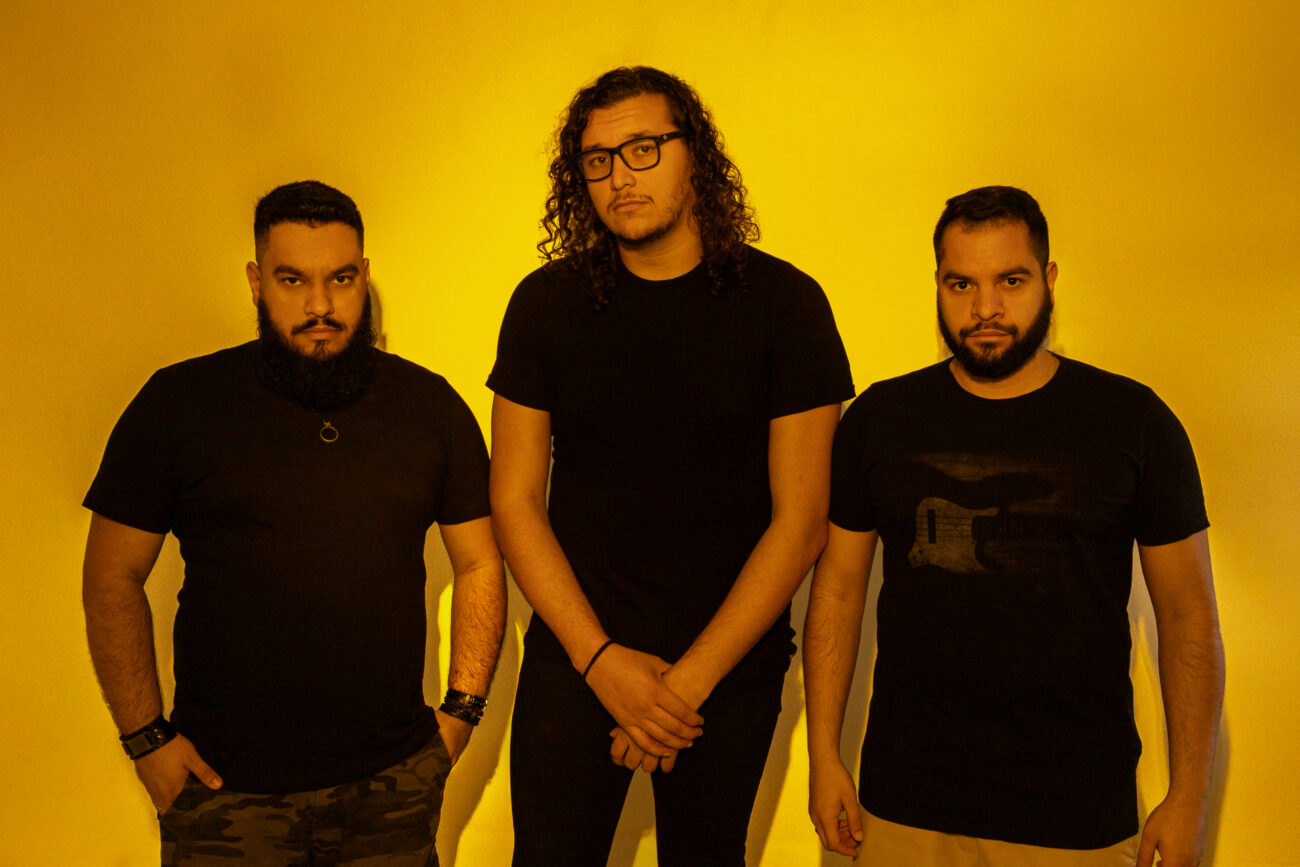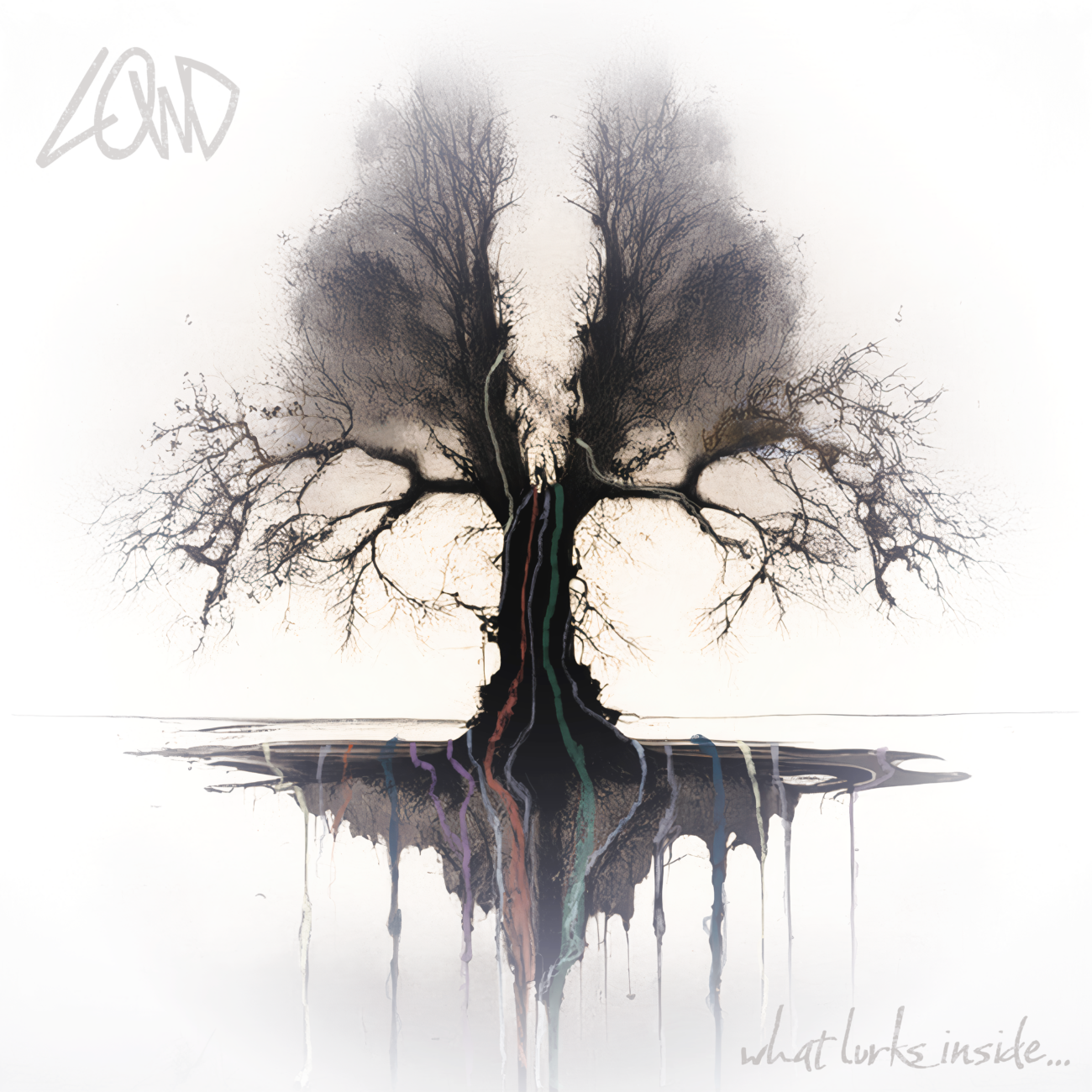LOWD: Brazilian trio explores the underlying secrets of the human psyche
Founded in Rio de Janeiro by Raphael Matheus (vocals/guitar), Bruno Cabral (bass) and Victor Cabral (drums), LOWD have made a name for themselves in the city’s underground scene. This September, they released their first full-length studio album, “What Lurks Inside”. The album features 7 tracks which deeply explore mental health.
These songs invite the listener to reflect upon the challenges of perceiving reality, death, and the non-stop search for the meaning of life, through the therapy sessions of a central character. Each track reveals a different phase in his trajectory, culminating into the metaphoric vision of a tree which bleeds different emotions, stressing that beauty also lurks in the shadows of existence.
All tracks have their peculiar traits and explore emotions that all human beings face throughout their lives, metaphorically symbolized through images based upon Rorschach’s test. The central theme of this album is mental health, and its goal is to exercise reflecting on this subject through the use of sound and image, in order to stimulate the mind and let out one’s feelings.
Chaoszine had the opportunity to have a chat with all three band members, who spoke of the new album, as well as the band’s origins and what it’s like to be an independent band in Brazil.
Hello and thank you for speaking to Chaoszine.
LOWD: Hi, thanks for talking to our band.
You have recently released your album “What Lurks Inside” with a concert and release party. How was that experience?
Raphael: I am still processing that! One week before the release, Spotify started to promote our record, put us on some playlists, and people from different countries started listening to our music. So, better than we expected.
How did LOWD start as a band?
Raphael: Victor and Bruno, who are brothers, used to go to the studio with their cousin, and I played with them once – we have been friends since 2005. I started to play because of them. And I remember it was Victor who introduced me to Guitar Hero, I wasn’t particularly into rock back then. I really liked this one song, it was “One” by Metallica. And I got to their place to play with them, and Bruno was there, playing it on guitar. I asked him to teach me, I wanted to learn how to play. So I learned to play acoustic guitar, I started out with tablature, completely self-taught. So, when they started to go into the studio, I joined them, and it kinda worked out. Bruno and I on guitar and Victor on drums. One day I decided to write a song, and “What You Deserve” came into being. So, Bruno decided to play the bass, and we started to write music together.
Victor: At the time, a friend of mine had a band, Intrépida, and we kind of learned from them how to play at venues, how to organize underground events, and all that.
What are your main influences?
Victor: Metallica, Megadeth and Foo Fighters influence all of us. For me, when I create the drum lines, I try to include a lot from Alter Bridge and Fall Out Boy. Bruno listens to Surra and Sepultura, besides Slayer. He’s the heavy music guy.
Raphael: Lately, I have been influenced by prog, especially Opeth, the atmospheric stuff from “Damnation”. I’m also into Firewind, I think some of Gus G’s solos influence me a lot. So, Metallica is a main influence, like even “Load” and “Reload,” which divide people’s opinions. I also listen to Porcupine Tree a lot. Besides, I used to have more international influences, but started to look inside the country a lot, Brazilian bands like Black Pantera, a power trio, with a more political anti-racist connotation, besides Sepultura, obviously.
Let’s talk about the new album. It addresses the mysteries of the human psyche, in a very cathartic way. It starts with “What You Deserve.” Can you talk about it a little bit?
Raphael: Yes, the first track speaks of evil people, and the feeling you get when you realize that. There is not much to do but to desire that they should be punished, it’s like a grudge that consumes you, but it’s not a good feeling to have. So, it’s a song about something that you’re trying to purge. The second track “Anger,” is more about an explosion of anger and hatred.
Victor: Yeah, “What You Deserve” is like ‘let’s wait for karma to get this evil person’.
Raphael: I even used religious metaphors in this song, like what they deserve on Judgement Day.
One of my favourite songs on the album is “Sorrow”, a melancholy song.
Victor: It’s my favourite song on the album, too. It’s the song I have a special thing about, the one that took longer to get sharp in the studio. The title says it all: it’s a sadness that works as a feedback loop, you are sad and think of your sadness and it makes you even sadder to think about it… like a path you have to go through.
Raphael: It’s a link of the sorrow with depression. It’s a poetic take on it. It also relates to medication, too. But besides the medication, you gotta do your part. Move yourself towards healing.
“Anxiety” reminded me of Dream Theater’s “Panic Attack” from “Octavarium”, as far as the lyrics go.
Raphael: This is a cathartic song. It makes you feel like you have anxiety when you hear it. It’s a talk between a person and their anxiety, and it takes over the person. It’s a toxic relationship.
Victor: It’s like depression is a silent enemy, but anxiety comes with a bang, and makes you suffer things physically, it affects your body.

“Uncertainty” is a descriptive song about depression.
Raphael: Exactly. It comes from a place when I understood I had depression. Bruno suggested the cover art were grey. The previous song, “What You Give” mixes with the beginning of “Uncertainty”. I had a bad break up in a relationship during the peak of a depression. So, these two songs are really connected. It’s a quest for the understanding of how much to give to another person, and how much they are willing to give to you as well. I was at that point in my life trying to understand who I was before the relationship, and if that version of me was really good, it was not a depressed person, but was it who I wanted to be?
“Hallucination” is one of my favourites on the album.
Raphael: This is a song that came into being after the pandemic. It wasn’t supposed to be on the album, but this song has something different about it. It came into being as an idea, and the lyrics came afterwards. It tells the story of a boy growing up, and he becomes all that he did not want to become. And it’s about the need to escape things. This boy is then lost in a world of fantasy, like for instance, video games. It takes your will to live your real life. This simple escapism. The naivety of thinking that it’s a feasible way out.
Victor: This one was one of the most collaborative lyrics on the album. We even tweaked the idea a little bit. So, in the middle of the gibberish singing of the early versions of the song, Raphael let out the word “hallucination”. And we decided to make that the theme of the song. A kid who lived a in a world of chaos who decided to escape the real world, through whatever, drugs, video games, but to leave his reality.
This album is like a therapy session, with the colours and Rorschach’s test.
Raphael: I understood, with time, that music sort of saved me and I decided to purge my demons through music, and in the process, maybe help others like other music has helped me. The album goes through different colours, different energies, up and down. It might feel a little crazy at times, I think. So, we thought that mental health was a major subject our band should address. The band is called “LOWD” because of the loudness of the noise inside our minds. We thought mental health had to be our main theme. This speaks of another influence: Chester Bennington, who used to write a lot about this theme. So, Bruno, brought the idea of Rorschach’s test to us, which we embraced: we used a different image of this test, with different colours, for each track of the album.
Victor: There is an easter egg in “What You Deserve”. So, we associated green to it, just like the Disney villains are always represented by green.
Raphael: We used purple for “Hallucination” referencing Black Sabbath. And each song is represented by its own colour. So, we thought of the album like a treatment with a therapist, and each of these images is like a metaphor of a therapy session about that subject. The patient, in his mind, takes a different colour and paints that image on a paper. So, after talking about it, the subject crumples the sheet of paper and throws it away, as he realizes he does not need to feel that way anymore. Until he figures out that his treatment is over, and it is the tree that is the cover art of the album. And that was made with the help of artificial intelligence. We tweaked it with the colours to represent the different feelings from each song.

How is it to be an independent band in Brazil?
Victor: You have to try to be a little bit of everything, not just a musician. You gotta understand production, how to organize and promote an event, take care of the artwork, everything, really. You don’t have a team, like the bigger artists do. We have to be self-made men.
Raphael: It’s very complicated from the perspective of venues to play. We have a serious technical problem at many venues. We know we shouldn’t play in some places because the sound is not good, but we feel like we need to perform there in order to build an audience. These are traditional places that are part of the underground scene here. Take the example of Black Pantera again: they have played Rock in Rio festival, the most important stage in the country, but they have also played one of these underground stages with all their technical difficulties, because they understand the importance of catering to a part of the audience that cannot afford to go to a very expensive festival like Rock in Rio.
Bruno: Sometimes people don’t go see a smaller band because they are always playing, and maybe they’ll catch them next time. But a bigger band, who rarely comes to play in Rio, they will think: “I have to go now, I don’t know when they are playing here again.” About the technical difficulties, its mostly about logistics. In order to have a good sound, the band has to bring their own equipment, besides all the instruments. So, this makes it harder and more expensive to get to the venues, set up and play. Some venues don’t provide anything for you to work with, as far as equipment goes, and then they complain if your sound is not perfect. Their lack of quality reflects badly on us artists. So, we three talk a lot about that, like we have to make do with what we’re given, but trying to do our best, always.
Thank you so much for this interview.
LOWD: We thank you.
You can listen to LOWD‘s album “What Lurks Inside”, below: